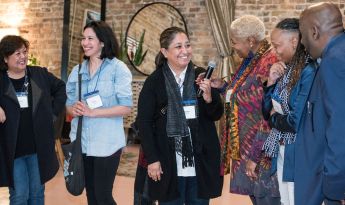When Christina Sambor moved back to her hometown of Bismarck, N.D., she found a community transformed. It was 2012 and tens of thousands of people had moved to western North Dakota in search of high-risk, high-paying jobs throughout the resurgent Bakken oil fields. Like many of her neighbors, Sambor noticed that among these newcomers were scores of women. And, like her neighbors, she saw news reports about the increase in prostitution.
“Think about any wild west film,” she says. “There was always that underlying story of women being around for that purpose. It really wasn’t a huge surprise that [it was happening] in North Dakota.”
What surprised Sambor, however, was the prevailing assumption that all of these women were there on their own free will. She often heard people say, “It doesn’t look like anybody’s being forced to do anything.” But she knew that wasn’t the case. Before moving back to Bismarck, Sambor worked for the Polaris Project, an organization working to prevent human trafficking in the United States. Her experience told her that the so-called “willing prostitutes” were often anything but. She saw the need for a leader to step in and shed light on the reality of the situation, and what she needed was an entry point.
In 2014, Sambor received a Bush Fellowship, which she is using to gain the experience and training she believes are necessary to become a more effective leader in the fight against human trafficking in North Dakota. That includes working to obtain an Executive Certificate in Transformational Leadership from Georgetown University.
“In that program, I’m learning about what true leadership means,” she says. “A lot of it comes back to how much you honor, appreciate and empower others around you to join you in the work that you care about.”
"I'm learning about what true leadership means. A lot of it comes back to how much you honor, appreciate and empower others around you to join you in the work that you care about."
That lesson helps guide Sambor in her current role as the full-time coordinator for FUSE, a grassroots coalition working to address human trafficking in North Dakota. Created in June 2014, FUSE — which stands for a Force to end hUman Sexual Exploitation — quickly established itself as a force to be reckoned with. They received a Community Innovation Grant from the Bush Foundation which allowed them to organize a statewide anti-human trafficking summit. The summit was attended by more than 250 statewide advocates and political leaders and generated momentum that carried over to the 2015 legislative session.
In its first year at the legislature, FUSE led a successful effort to enact a host of measures that address human trafficking, including a Safe Harbor Law for trafficked minors, increased punishments for consumers (“Johns”) and facilitators (“pimps”), and $1.25 million in new funding to allow the Attorney General’s Office to implement programs that support trafficking victims.
“I can’t ever overstate the impact that the Bush Foundation has had on this work for North Dakota,” Sambor says. “Both for me personally and also for FUSE generally, Bush was the catalyst from this idea to being able to accomplish great things.”
ABOUT THE LEGISLATION
Understanding the Uniform Act on Prevention of and Remedies for Human Trafficking
Five North Dakota nonprofit organizations came together in 2014 to create the Force to end hUman Sexual Exploitation (FUSE). As FUSE coordinator, Christina Sambor helped push forward major anti-trafficking legislation in collaboration with Uniform Law Commissioners. Below are highlights of UAPRHT, enacted Aug. 1, 2015.
“Safe Harbor Law”
- Views the child as a victim, not a criminal
- Creates immunity for underage victims with misdemeanor offenses directly related to trafficking
Expungement
- Allows victims to request established charges be expunged if they are a direct result of being trafficked
Trafficker & Consumer Punishments
- Increases penalty class for consumers, or “Johns,” who engage with minor trafficking victims
- Increases penalty for prostitution facilitation (“pimping”) from an A misdemeanor to a C felony
- Increases punishment for traffickers recruiting from vulnerable populations such as women’s and homeless shelters
- Extends statute of limitations for human trafficking of adult victims from three years to seven years
Major Funding
- Appropriates $1.25 million from the general and oil impact funds to the Office of the Attorney General to implement a grant program for treatment and support of human trafficking victims
For more information on UAPRHT, visit uniformlaws.org.


